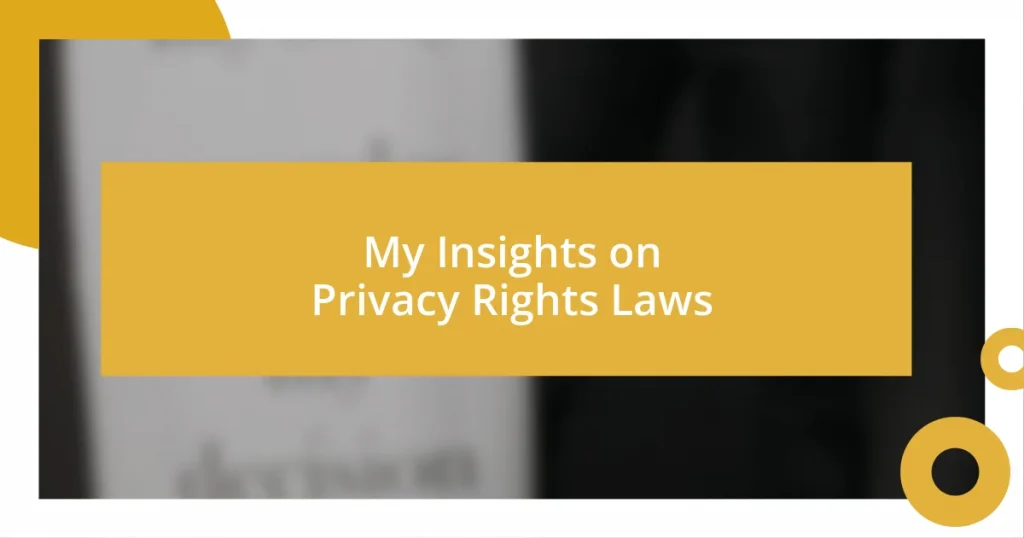Key takeaways:
- The General Data Protection Regulation (GDPR) and California Consumer Privacy Act (CCPA) empower individuals with control over their personal data, reflecting a growing awareness of privacy rights.
- Protecting personal information is essential; strategies like using strong passwords and reviewing privacy settings can enhance data security.
- Future trends indicate stricter privacy laws and global collaboration on data protection, influenced by emerging technologies and consumer demand for privacy.
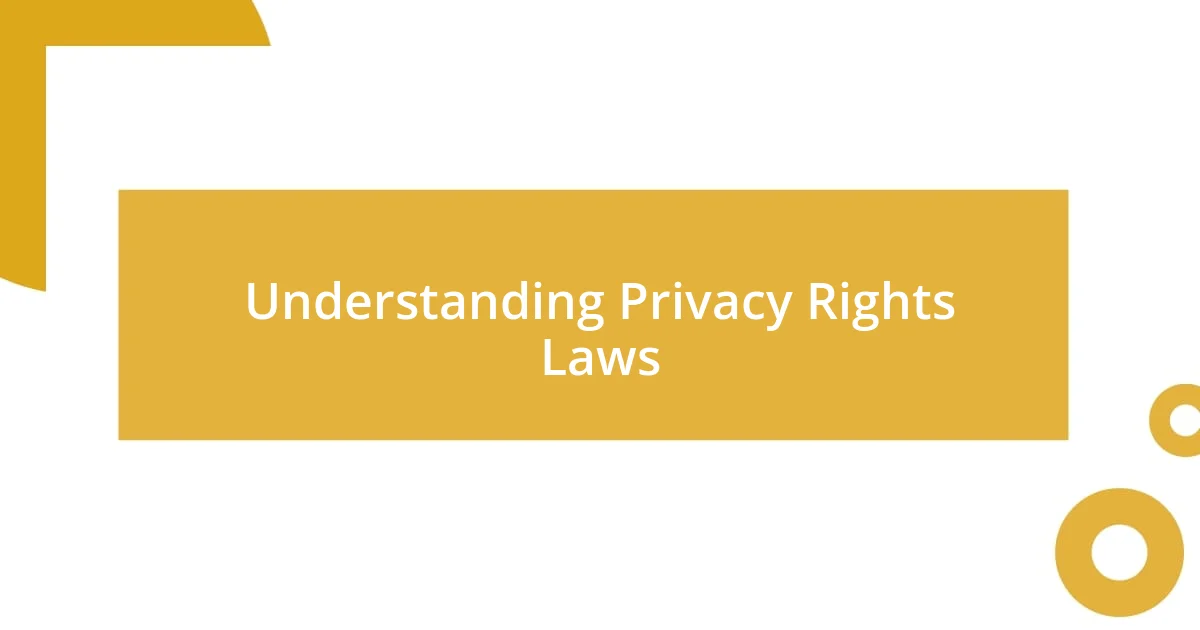
Understanding Privacy Rights Laws
Understanding privacy rights laws can feel overwhelming, but I find it fascinating how these laws impact our daily lives. For instance, think about a time when you received a targeted ad for something you just talked about. It raises questions, right? How much do companies know about us, and how can we protect our information?
When I first learned about data privacy laws, it struck me how they seek to balance individual rights with technological advancements. For example, the General Data Protection Regulation (GDPR) in Europe mandates strict guidelines on data usage, giving individuals more control over their personal information. Isn’t it reassuring to know we have rights that can hold organizations accountable?
I remember a conversation with a friend who was adamant about opting out of data tracking services. She spoke passionately about her discomfort with how much data various platforms collect. It made me think: how often do we stop to consider the implications of our online activity? Understanding these laws isn’t just about compliance; it’s about empowering ourselves in a digital world.
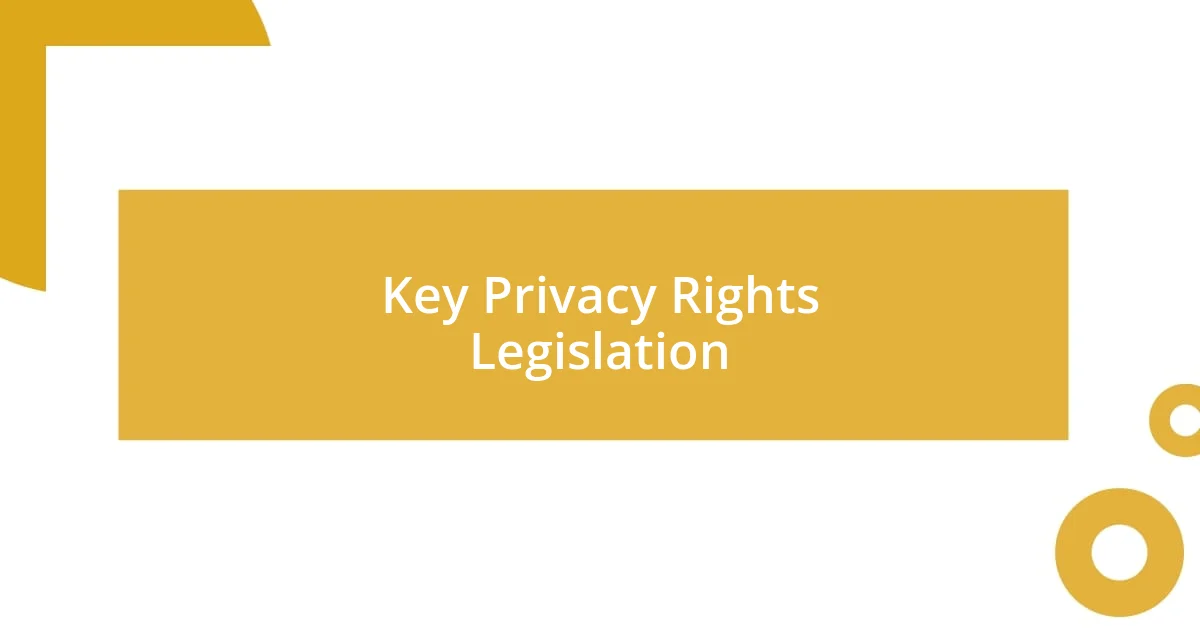
Key Privacy Rights Legislation
When diving into key privacy rights legislation, I cannot overlook the importance of the California Consumer Privacy Act (CCPA). This law, which took effect in 2020, provides California residents with robust rights to control their personal information. I remember when friends in California eagerly shared their newfound ability to request details about the data companies collect on them. It felt empowering to see people engaged in a conversation about their privacy rights, reflecting a growing awareness of how much personal data is at stake.
Here are some significant privacy rights legislations worldwide:
- General Data Protection Regulation (GDPR): Established in the EU, this regulation enhances individual rights and holds companies accountable for data protection.
- California Consumer Privacy Act (CCPA): Grants California residents the right to access and delete their personal data, along with opting out of data selling.
- Health Insurance Portability and Accountability Act (HIPAA): Focuses on protecting personal health information in the United States, ensuring confidentiality and security of medical data.
- Children’s Online Privacy Protection Act (COPPA): Protects the privacy of children under 13 by requiring parental consent for data collection.
- Personal Information Protection and Electronic Documents Act (PIPEDA): Canadian legislation that obligates organizations to obtain consent when collecting, using, or disclosing personal information.
Reflecting on my own experiences, I feel a surge of optimism each time I read about new legislation aiming to protect our privacy rights. It’s like standing at the forefront of a movement where individuals reclaim authority over their personal data. As organizations adapt to these laws, I see a potential change in how we interact with technology, creating a more respectful digital environment.
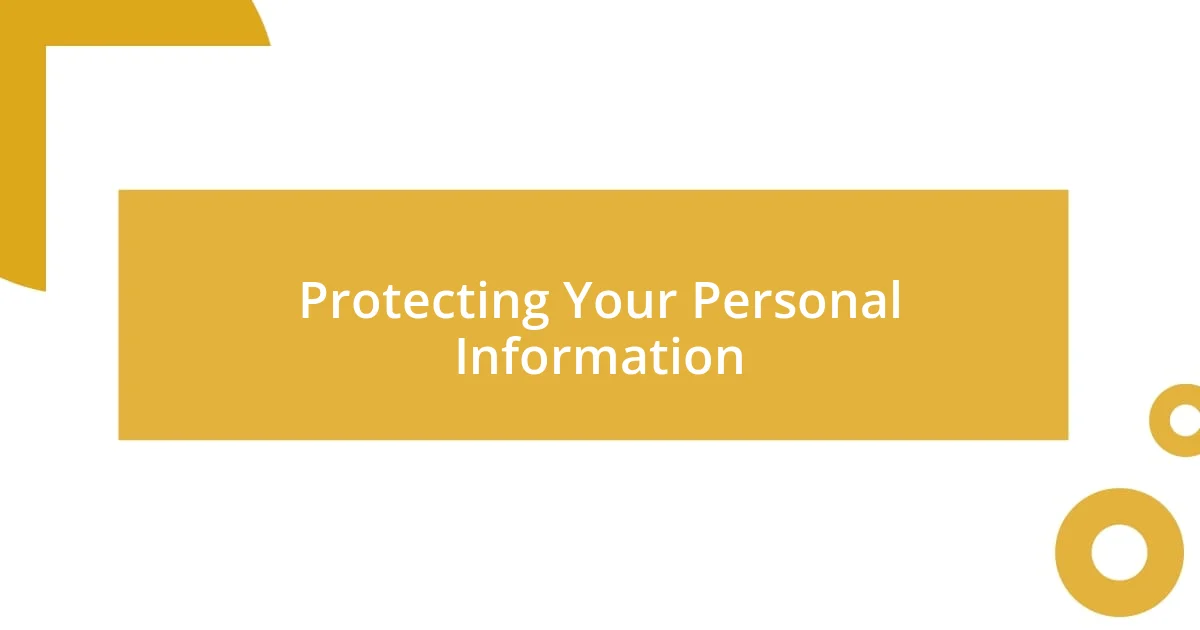
Protecting Your Personal Information
Protecting your personal information is more critical than ever in our fast-paced digital age. I vividly recall my realization a few years ago when a close friend fell victim to identity theft. That experience underscored the necessity of being proactive about our data. It made me rethink the information I share online, from social media posts to the details I provide on various apps.
As I navigated the digital landscape, I learned that using strong passwords and enabling multi-factor authentication can provide an extra layer of security. Remember the last time you logged into an account and faced those nagging prompts for unusual activity? It’s a relief to know companies are implementing safeguards, but it’s also a reminder that we must stay vigilant ourselves. Ultimately, being informed and cautious about our digital footprints helps in maintaining our privacy.
One practical tip I’ve adopted is regularly reviewing my privacy settings across platforms. I often ask myself: how often do we check these settings? By doing so, I’ve discovered features that allow me to limit who can see my information. I feel empowered knowing I can take charge of my data, making deliberate choices about what to share and with whom. Our personal information is precious; it’s worth the effort to protect it.
| Strategy | Description |
|---|---|
| Use Strong Passwords | Create complex passwords using a mix of letters, numbers, and symbols. |
| Enable Multi-Factor Authentication | Add an extra layer of security by requiring a second form of verification. |
| Review Privacy Settings | Regularly check and adjust privacy settings on your accounts to control who sees your information. |
| Be Cautious with Public Wi-Fi | Avoid accessing sensitive information over unsecured networks to protect your data. |
| Limit Sharing Personal Information | Think twice before sharing details on social media or apps that aren’t necessary. |
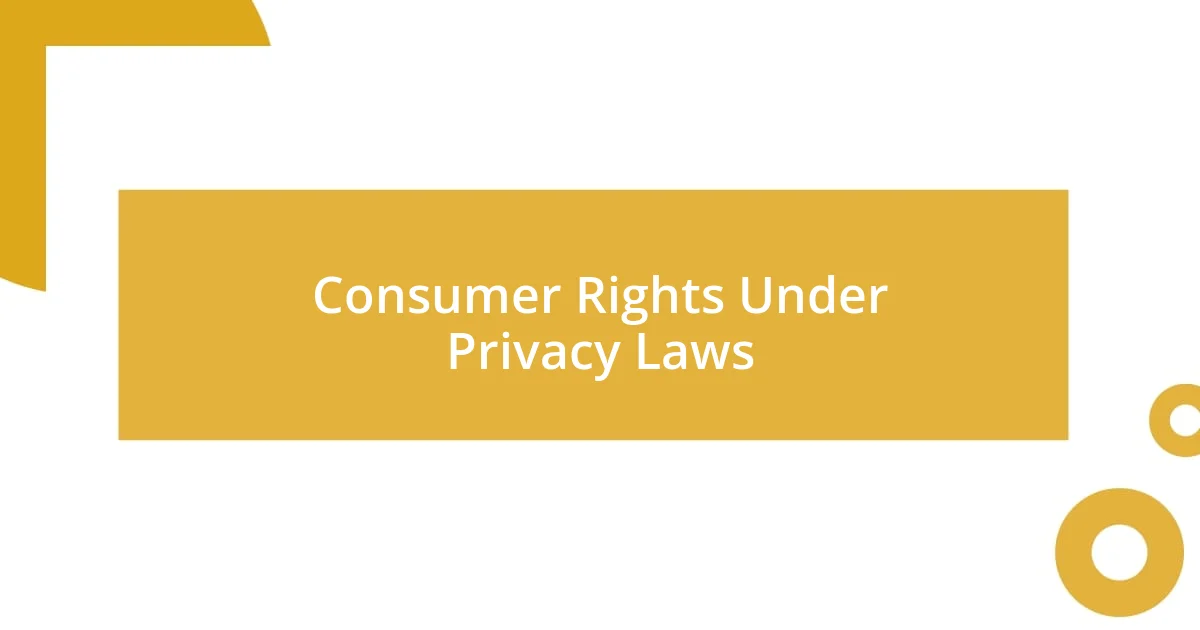
Consumer Rights Under Privacy Laws
The landscape of consumer rights under privacy laws is ever-evolving, and it truly fascinates me how these laws are granting individuals more control over their personal data. I remember when I first learned about my right to opt out of data selling under the CCPA. It was like discovering a hidden lever of power—I could take a stand against companies profiting from my information. Have you ever felt that exhilarating sense of empowerment when you realize you can say “no” to invasive practices? Knowing that I have this option drives me to be more conscious of the information I share online.
One interesting dimension of consumer rights is the right to access and delete personal data. Not long ago, I decided to exercise this right with a popular app. After a few emails back and forth, I was surprised to see how much data they held on me! It made me reflect on the extent of my digital footprint. I wonder how many others are unaware of the sheer volume of personal information stored in the depths of the internet. The ability to request your data is not just a legal right; it’s a crucial step in understanding and reclaiming your digital identity.
As I observe the implementation of these laws, I’m struck by how they shift the power dynamics between consumers and companies. Each time I see another story about someone successfully deleting their data or opting out of a marketing list, I feel a sense of community. Don’t you think it’s empowering to know we’re all part of this collective journey toward greater privacy rights? Together, we’re redefining what it means to have control over our own information, and that’s something worth celebrating.
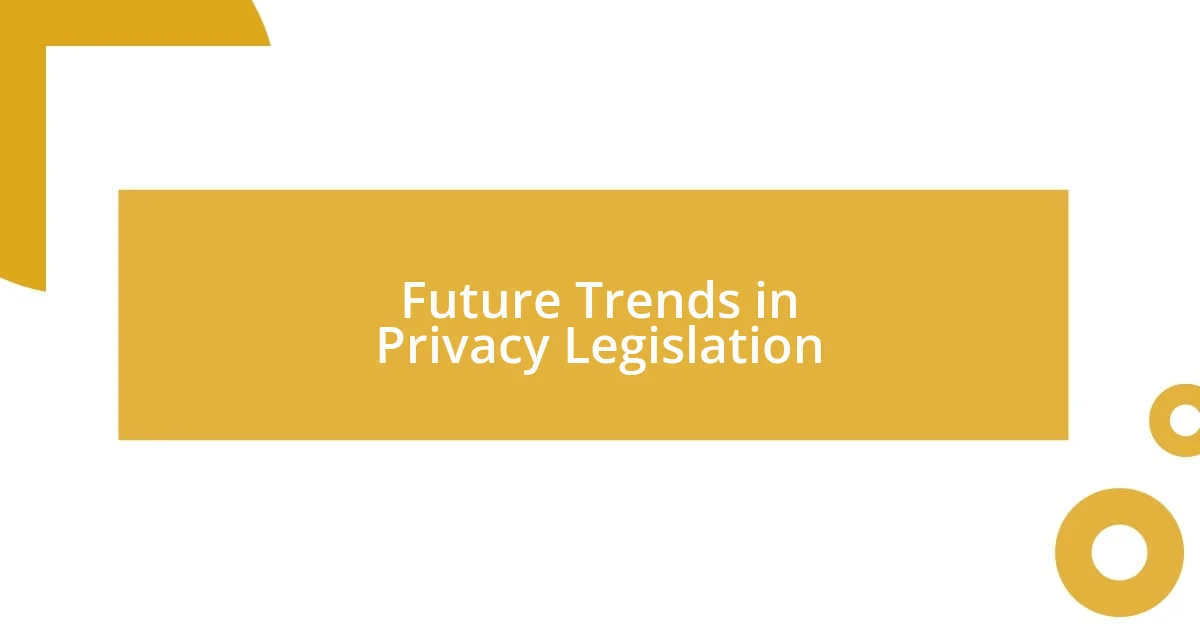
Future Trends in Privacy Legislation
As we look ahead, it’s clear that privacy legislation will likely adopt more stringent measures, reflecting growing concerns about the misuse of personal data. I can’t help but think back to the days when data breaches seemed almost like a regular news cycle. It felt unsettling to realize that my personal information was floating around out there. The shift toward requiring clearer consent mechanisms, especially for data collection, seems like a much-needed step forward.
I’ve noticed an increasing focus on global standards in privacy laws. For example, the EU’s GDPR has set a benchmark, and I often wonder whether the U.S. will follow suit with its own version. It makes me feel hopeful that as countries begin to collaborate on privacy issues, consumers will gain more rights and protections. Do you remember the last time you read a privacy policy? With these evolving regulations, understanding such policies might soon become much less daunting.
Moreover, emerging technologies like AI pose unique challenges and opportunities for privacy rights. I’m curious about how these technologies could change the landscape of personal data protection. In my experience, navigating an app that utilizes AI for personalization feels exciting yet slightly invasive. It’s fascinating to think about how legislation will adapt to ensure technology enhances our lives without compromising our privacy. Will the future of privacy legislation be shaped by our collective demand for security and respect for our data? Only time will tell, but I’m optimistic about the direction we’re heading.









